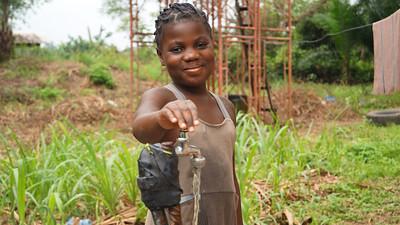
From Mozambique in the South to Morocco in the North, 20 million people in rural and urban areas of Africa have been provided access to clean drinking water for the first time thanks to African Development Bank (AfDB) projects, an evaluation report released by the Bank’s Independent Development Evaluation (IDEV) found. Such access is particularly important in this time of the COVID-19 pandemic, since the spread of the virus is closely related to water and sanitation. Ensuring reliable access to clean water for drinking and handwashing can reduce the transmission of the corona virus and help people stay healthy. But today, about 2.2 billion people lack access to safely-managed water supply, and most of these are in Africa’s poorest regions. In addition, over 750 million Africans lack access to improved sanitation. These water and sanitation challenges are likely to be further compounded by Africa’s looming climate change crisis, and to worsen the current COVID-19 situation. To address these challenges, the Bank has invested UA 4.5 billion over the past ten years towards promoting universal and equitable access to safe and affordable drinking water and adequate and equitable sanitation — one of the key Sustainable Development Goals (SDG 6).
The ongoing COVID-19 pandemic also affects agricultural production, with a negative impact on food security and nutrition. Food insecurity could kill more people in Africa than COVID-19. For comparison, the death rate from COVID-19 in the worst hit country in Africa is about 0.06 to 0.08%, less than a tenth of a percentage point. In 2017, ten countries in Africa lost over 1% of their total population to premature deaths from malnutrition, mostly children and women. According to IDEV’s evaluation report, the Bank’s projects in agricultural water management played a key role in reducing the drudgery of fetching water for domestic and agricultural uses, and in increasing agricultural production and productivity in terms of diversification of agricultural crops. They also increased the income of project beneficiaries. Agricultural water management can help African farmers to optimize production, feed a rapidly growing population and accelerate the recovery after the COVID-19 pandemic, which makes the lessons from this evaluation particularly pertinent.
Despite these positive results, the Bank can do more to address Africa’s challenges and accelerate human and economic development on the continent. IDEV’s evaluation provides key lessons to improve the Bank’s water sector interventions and accelerate the longer-term transformation of Africa’s agriculture and health sector.
IDEV conducted four evaluations related to the water sector: three project cluster evaluations (water supply and sanitation in both rural and urban contexts, and agricultural water management) and one water sector evaluation. These evaluations summarize the evidence, findings and lessons learned from an independent evaluation of support provided by the AfDB to the water sector over a period of 12 years (2005-2016), covering more than 400 operations across the continent with a total project cost of USD 8.2 billion.
One of the key success factors found by the evaluation is that the adoption of approaches driven by the beneficiaries is relevant when applied in a coherent manner. The extent and quality of collaboration with local stakeholders matter. In Ghana, for instance, active participation by community members throughout project implementation was noted. This was made possible due to over 600,000 community members being involved in the various project activities related to raising awareness and understanding of the demand-driven approach.
The evaluation also identified some barriers to the success of a water sector intervention. For example, the achievement of development outcomes can be undermined by poor service delivery, insufficient human capacity, limited financing and performance of the sanitation and hygiene component or lack of appropriate assessment of critical water sector risks. Moreover, poor quality feasibility studies led to poor quality of project design and subsequent implementation challenges.
Overall, having a long-term view of water interventions is paramount for post-achievement monitoring of the functionality of facilities and the sustainability of outcomes.
These lessons can provide some quick responses to the ongoing COVID-19 and food security crisis, and accelerate longer-term transformation of Africa’s agriculture and health sector.

